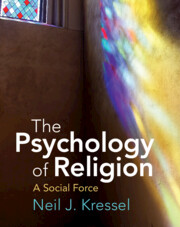Book contents
- The Psychology of Religion
- The Psychology of Religion
- Copyright page
- Contents
- Detailed Contents
- Preface
- Acknowledgments
- Part One Introduction
- Part Two The Great Theorists
- Part Three How Psychologists Study Religion
- Part Four How People Think About and Experience Religion
- Part Five The Effects of Religion
- Part Six Using the Psychology of Religion and Spirituality
- References
- Index
- References
Part Two - The Great Theorists
Published online by Cambridge University Press: 01 November 2024
- The Psychology of Religion
- The Psychology of Religion
- Copyright page
- Contents
- Detailed Contents
- Preface
- Acknowledgments
- Part One Introduction
- Part Two The Great Theorists
- Part Three How Psychologists Study Religion
- Part Four How People Think About and Experience Religion
- Part Five The Effects of Religion
- Part Six Using the Psychology of Religion and Spirituality
- References
- Index
- References
- Type
- Chapter
- Information
- The Psychology of ReligionA Social Force, pp. 45 - 166Publisher: Cambridge University PressPrint publication year: 2024

